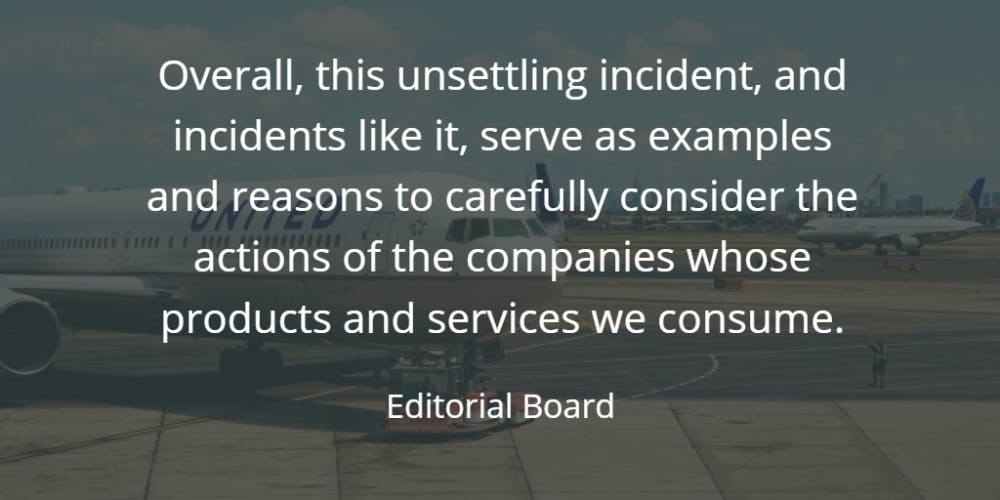Following a violent incident involving an airline passenger being forced off a plane earlier this week, United Airlines is in the midst of a media scandal that has since cost the company nearly a billion dollars in the market value. Cell phone videos of Dr. David Dao, the victim of United Airlines’ excessive brutality, being dragged down the aisle with a bloodied face have since gone viral. In response, to protest the incident, United Airlines customers vented on social media, vowing to never fly United while publicly disposing of their airline reward cards. Overall, this unsettling incident, and incidents like it, serve as examples and reasons to carefully consider the actions of the companies whose products and services we consume.
Notably, the United Airlines incident follows a recent trend of controversy involving large corporations on social media. Last month, United Airlines received backlash for preventing a group of young girls from boarding a plane wearing leggings, claiming that the girls were in violation of the airline’s dress code. Moreover, within days of one another other, Nivea and Pepsi disseminated advertisements that were seen to blatantly promote colorism and subtly undermine the Black Lives Matter Movement, respectively. Uber, which is by far the largest transportation provider of the digital revolution, has also received negative backlash in light of recent reports of a misogynist workplace environment facilitated by the CEO of the company.
Controversies like that showcased by United Airlines incident have catalyzed discussion around corporate accountability and ethical consumerism. Consumers, especially in the age of social media, possess the ability to implement mass boycotts of products that violate the basic tenets of social justice and equality. Perhaps most notably in history, disenfranchised black residents utilized their purchasing power within the city transportation system to call for the desegregation of all public transportation during the Montgomery Bus Boycott of 1956. In many ways, boycotting is an important and often underappreciated tool that consumers can utilize to affect corporate accountability.
Unfortunately, boycotting for the average consumer can be an extremely daunting task. A lack of consumer choice and competition can easily restrict a consumer’s ability to boycott. In the United States, for instance, United Airlines is one of four major airlines, which together account for almost 69 percent of the market, limiting the options consumers can choose from. Moreover, within the American consumer market, some people simply do not possess sufficient capital to forgo a certain product to promote ethical consumerism. The existence of so called “food deserts” within low-income neighborhoods can attest to this reality that many consumers of more modest means currently face.
However, for consumers, including many students here at Duke, who do possess the purchasing power to choose between products, ethical consumerism is an effective way to support a company whose actions and policies align we agree with and to tangibly denounce the companies whose actions we disagree with. Most recently, negative publicity surrounding allegations of white-washing in Ghost in the Shell helped to tank the film’s box office performance as moviegoers actively boycotted the film. In the digital age, angry tweets and Facebook posts are not enough to change a company’s treatment of customers and employees. Consumers must react to such incidents through the actions of our wallets.
Get The Chronicle straight to your inbox
Signup for our weekly newsletter. Cancel at any time.

